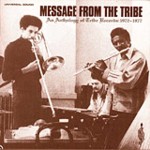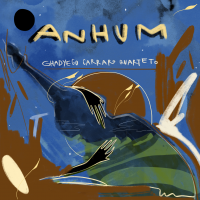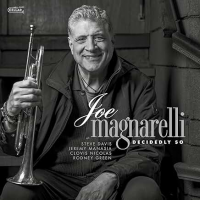Home » Jazz Articles » Album Review » Tribe: Message From The Tribe: An Anthology of Tribe Rec...
Tribe: Message From The Tribe: An Anthology of Tribe Records 1972-1976
Less well remembered—and until now, barely documented—was the Tribe collective, which ran a record label and published a quarterly black awareness magazine, and was active in Detroit from 1972-77. Among its organizers were trombonist Phil Ranelin, saxophonist Wendell Richardson and trumpeter Marcus Belgrave.
British label Soul Jazz Records' lovingly put together package Message From The Tribe: An Anthology Of Tribe Records 1972-1976 includes a one-hour compilation of Tribe recordings, a 60-page booklet, most of it consisting of articles from Tribe magazine, and a selection of postcards featuring the magazine's front covers.
Between them, the Tribe musicians played with, on the one hand, drummer Max Roach, saxophonist Charlie Parker, keyboards spaceman Sun Ra, guitarist Grant Green and pianist McCoy Tyner, and on the other, with singers Stevie Wonder, Marvin Gaye and The Temptations; before Motown Records' relocation from Detroit to Los Angeles in 1972, the musicians had supplemented their jazz earnings with session work at Motown. These experiences—and an enthusiasm for the electric grooves being contemporaneously championed by pianist Herbie Hancock—all come together on the recordings included here. P-Funk originator George Clinton may have been the man who coined the expression "free your ass and your mind will follow," but Tribe subscribed to the same aesthetic, albeit with a lot more jazz—some of it distinctly "out"—thrown into the mix.
The music is vibrant and timeless, but to read through the articles from Tribe is, in 2010, to step back 35 years. These were angry times, and it's no surprise to come across a review of a TV documentary which concludes: "Any doubts that the viewing audience may have had about the inherent bestiality of the white man were laid to rest with this telecast." More surprising is the inclusion of a sympathetic profile of the Detroit-based civil rights activist Father William T. Cunningham, "a Caucasian working towards the elimination of racism, discrimination and bigotry."
An important addition to the black music archive, Message From The Tribe walks the talk.
Track Listing
David Durrah: Space 2; Phil Ranelin & Tribe: Vibes from the Tribe; Phil Ranelin & Tribe: Sounds from the Village; Doug Hammond: Moves; Tribe: Beneficent; Tribe: What We Need; Marcus Belgrave: Space Odyssey; Phil Ranelin & Tribe: For the Children; The Mixed Bag: La Margarita; Doug Hammond: Wake Up Brothers; Wendell Harrison & Tribe: Tons and Tons of B.S.; Tribe: Farewell to the Welfare.
Personnel
Marcus Belgrave: trumpet, flugelhorn, percussion, miscellaneous instruments (2, 3, 5-7); Charles Moore: trumpet, flugelhorn, miscellaneous instruments (5, 6); Phil Ranelin: trombone, vocal, percussion, miscellaneous instruments (2, 3, 5-8, 11); Kareem Harris: tuba (11); Ralph Jones: soprano saxophone (11); Otis Harris (or Harrison): alto saxophone (4, 10); Wendell Harrison: tenor saxophone, flute, miscellaneous instruments (2, 3, 5-8, 11); Aaron Neal: bass clarinet, miscellaneous instruments (5); Larry Nozero: reeds, flute, cuica (9); Buddy Budson: electric piano (3); Kenny Cox: electric piano (2); Geoff Dunsun: keyboards (9); David Durrah: Moog & Arp synthesizer, piano, Fender Rhodes (1, 4, 10); Daryl Dybka: mini Moog synthesizer (7); Charles Eubanks: electric piano, miscellaneous instruments (6); Harold McKinney: piano, electric piano (7, 8, 11); Keith Vreeland: electric piano, miscellaneous instruments (5); Ralph Armstrong: electric guitar, bass (3, 8); Jerry Glassel: guitar (9); Charles Burnhorn: violin (4, 10); Travis Mickeel: violin (4, 10); Charles Metcalf: bass violin, electric bass (4, 10); Will Austin: electric bass, acoustic bass (6, 11); Ron Brookes: bass (9); Ron English: electric bass (2); Reggie (Sho Be Doo) Fields: acoustic bass (5); Lopez Leon: electric bass (2, 3); Ed Pickens: electric bass (7); Frederick Boon: percussion (4, 10); Roy Brooks: percussion, miscellaneous instruments (7); Lorenzo Brown: bongos (7); Ike Daney: drums, miscellaneous instruments (6); George Davidson: drums (2, 3, 8, 11); Barbara Huby (or Hubie): congas, percussion (3, 8, 11); Dave Koether: percussion (9); Bud Spangler: percussion (8); Dan Spencer: drums, percussion (9); Thomas (Turk) Trayler: percussion (4); Billy Turner: drums, percussion, miscellaneous instruments (5, 7, 11); Lawrence Williams: congas (11); Doug Hammond: drums, melodica & Arp synthesizer, vocals (1, 4, 10); Jeamel Lee: vocals (6).
Album information
Title: Message From The Tribe: An Anthology of Tribe Records 1972-1976 | Year Released: 2010 | Record Label: Soul Jazz Records
Tags
PREVIOUS / NEXT
Support All About Jazz
 All About Jazz has been a pillar of jazz since 1995, championing it as an art form and, more importantly, supporting the musicians who make it. Our enduring commitment has made "AAJ" one of the most culturally important websites of its kind, read by hundreds of thousands of fans, musicians and industry figures every month.
All About Jazz has been a pillar of jazz since 1995, championing it as an art form and, more importantly, supporting the musicians who make it. Our enduring commitment has made "AAJ" one of the most culturally important websites of its kind, read by hundreds of thousands of fans, musicians and industry figures every month.























